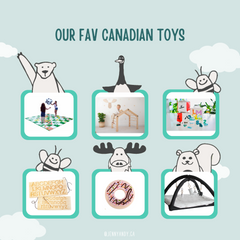
Every year, April 22 marks Earth Day, the anniversary of the birth of the modern environmental movement in 1970. Today, the fight for a clean environment continues with increasing urgency, as the consequences and damage of climate change become more and more apparent each day. This year’s 2022 theme is: “Invest In Our Planet”.
Earthday.org is calling for everyone—including citizens, businesses, and governments—to go all in and commit to protecting the planet.
How Jenny & Andy Is Investing In Our Planet
At Jenny & Andy, our products are made locally in Canada and we source our materials ethically and as sustainably as possible. We use GOTS-certified organic cotton for our Crinkle Toys, Plush Rattle Cubes, Hooded Towels, Wash Cloths, and Nursing Pads.
GOTS-certified cotton means the cotton is grown without pesticides (a massive contributor to greenhouse gas emissions) using humane labour practices. (Check out some behind the scenes footage during our last visit to our local organic cotton supplier and learn how the fabric is woven!)
One of the reasons why making our products locally, as well as in small batches for our baby lotion, is so important to us is because of the global footprint that manufacturing can have. So we do our utmost to source locally and produce locally in order to reduce our carbon footprint. And when we cannot, we opt for the most environmentally friendly options available.
Staggering Statistics

We did some research and found some staggering statistics. Statistics aren’t meant to scare people, but rather keep us informed about what is happening in the world around us how to make better predictions and decisions based on data.
-
Today, humans use about 50 percent more natural resources than we did 30 years ago, according to a report from Friends of the Earth.
-
Between 1970 and 2014, animal species populations saw an overall decline of 60 percent worldwide due to habitat loss, pollution, climate change, and other factors, according to the WWF.
-
In 2019, global carbon emissions from fossil fuels and industry reached a high of 36.44 billion metric tons. In 1980, that number was under 20 billion metric tons.
-
Extinction is a natural phenomenon, claiming about five species per year. But some experts suggest that we are entering the sixth mass extinction — one that is caused mostly by human activity.
- In 2016, the world’s’ cities generated 2.01 billion tonnes of solid waste, amounting to a footprint of 0.74 kilograms per person per day.
- Globally 70% of fresh water is used for agriculture. By 2050, an estimated 50% increase in agricultural production and a 15% increase in water withdrawals is expected.
- An estimated 5 trillion plastic bags are used worldwide each year. Let’s put a trillion into perspective: if we use time, then 1 trillion seconds is about 31,710 years.
Ways You Can Make A Positive Impact
There are many practical ways to contribute to make a positive impact. This Earth Day, you can take the first step or make your impact even greater. Here are some ways that you can make a positive impact for our Earth:
1. Help Protect Wildlife And The Natural Environment

- Organize a community cleanup. Go on a walk with a trash bag and help clean up litter from your local park or beach. It’s also a great way to get exercise, connect with nature, and work together with others towards a common goal.
- Join an environmental group. Joining a group keeps you educated and informed and allows you to network with other like-minded people.
- Consider donating to an environmental organization. You can even involve your children by splitting your child’s allowance into “savings” and “charity”. This allows them to be able to contribute with their own money and also learn about social and financial responsibility.
2. Connect With Nature

- Organize a treasure/scavenger hunt for your children. It'll be a fun and engaging way for kids to explore the outdoors, engage in teamwork, and use their critical thinking and executive functioning skills.
- Plan a family picnic. A picnic is a fun way to get the whole family outdoors for family time and is a great opportunity to have conversations with your children about nature and where food comes from.
- Go for a walk, jog, or hike on a trail on a nice day. You’ll be able to exercise your body as well as your appreciation for nature.
- Consider any hobbies you can do outdoors. For example, you can read a book outside or choose a natural subject to paint, sketch, or photograph.
3. Lower Your Carbon Footprint

-
Shop at a local farmer’s market. According to the Center for Sustainable Systems, food accounts for 10 to 30 percent of a household’s carbon footprint due to the emissions involved in producing and transporting food.
- When possible, opt to walk, bike, or even carpool to your destination.
- Lower your energy consumption. Turn off the lights, TV, and other appliances when they’re not needed.
- Calculate your carbon footprint with this free carbon footprint calculator by Global Footprint Network.
4. Educate Yourself And Others

-
Learn more about climate change. The Nature Conservancy has a great easy-to-digest FAQ page about climate change.
-
Learn About Canada’s Climate Policy. In March, Canada released its first-ever Emissions Reduction Plan. In it, the Government of Canada recognized the powerful role of Natural Climate Solutions in reducing emissions while supporting healthy, resilient and prosperous communities.
-
Talk about climate change. Experts believe that one of the most important things we can do to promote climate action is to talk about climate change with our friends and family. For some this will come naturally. But for others, talking about climate change can be hard or awkward. Check out this article by The Nature Conservancy to learn how to get started.
- Talk to your kids about the importance of nature and sustainability at an early age. Talk about why it’s important to you and how it’s relevant to your child’s world. The Kortright Centre for Conservation (in the GTA, Ontario) even has hands-on environmental education programs for kids.
We Have The Choice & The Power
Sustainability is the way to a better and brighter future. We, as business owners, as consumers, as individuals, as voters, and as members of a community, have the power to influence change for a better, more sustainable future.
You can be confident in your choice for your family and for the environment when you shop at Jenny & Andy.
Teach children about the importance of sustainability from day one with Jenny & Andy's 100% organic cotton toys and accessories:
- Ceballos et al. (2015). Accelerated modern human–induced species
losses: Entering the sixth mass extinction. American Association for the Advancement of Science. DOI: 10.1126/sciadv.1400253. - Center for Sustainable Systems, University of Michigan (2021). Carbon Footprint Fact Sheet. Pub. No. CSS09-05.
- Friends Of The Earth Europe (2009). OVERCONSUMPTION? Our use of the world´s natural resources.
- Global Footprint Network. What Is Your Ecological Footprint?
- Government of Canada (2022). 2030 Emissions Reduction Plan – Canada’s Next Steps for Clean Air and a Strong Economy.
- Nature Conservancy (2019). A Connected Conversation About Climate Change.
- Nature Conservancy (2018). Can We Talk Climate?
- Nature Conservancy (2021). Climate Change FAQs.
- Statista (2021). Annual CO2 emissions worldwide from 1940 to 2020.
- Statistics Canada (2018). Earth Day... by the numbers.
- Sustainability Management School (2019). Sustainability Statistics Worth Knowing in 2019.
- WWF (2018). Living Planet Report - 2018: Aiming Higher. Grooten, M. and Almond, R.E.A.(Eds). WWF, Gland, Switzerland.






